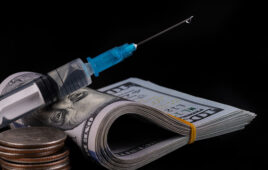GLENWOOD SPRINGS,
Colo. (AP) — A rare bacterial
infection contracted at a Denver-area hospital by a Glenwood Springs boy who is
battling leukemia prompted a national recall of tainted alcohol wipes.
The surgical prep pads, swabs and wipes manufactured by the
Triad Group of Hartland, Wis., are suspected of being contaminated
with a potentially deadly bacteria. The product was voluntarily recalled by the
company on Jan. 5 following a federal Food and Drug Administration
investigation.
Two months later, the boy’s mother, Jessica Armstrong,
remains on a mission to make sure what happened to her son does not happen to
others.
The Triad products were widely used in medical facilities
around the country, and were also available for retail sale to consumers under
a variety of product names at Safeway, City Market and Walgreen’s stores.
“Anyone who has or thinks they may have these prep pads
or wipes in their home needs to check to confirm the manufacturer, and discard
them in the trash immediately,” Armstrong said.
Her family’s ordeal received national media attention with
an MSNBC report earlier this week. That report referred to several infection
cases around the country blamed on the Triad wipes, including one involving the
death of 2-year-old boy in Texas
in early December of last year.
Jessica and husband Noel Armstrong’s story began when their
10-year-old son, Peyton, was air-lifted to Children’s Hospital in Aurora on
Oct. 18, 2010, after he had been extremely sick for several weeks.
At Children’s, he was diagnosed with a type of leukemia that
required quick action. Peyton had surgery to insert an internal catheter so he
could immediately begin chemotherapy treatment.
“Within 12 hours of the surgery, in the middle of the
night, he started having this excruciating pain,” his mother said.
“We really weren’t sure what to expect, and we knew it was a painful
surgery. But this was definitely not right.”
Soon, the pain was accompanied by a fever, indicating that
Peyton had contracted an infection. Infectious disease experts were called in,
and the cause of the infection was narrowed down to the Bacillus cereus
bacteria.
“We were told that it’s something not usually seen in
hospitals,” Armstrong said. “They said it was very serious, and they
were going to do everything they could to help him.”
Peyton was put on strong antibiotics to stabilize his
condition, and had to undergo another emergency surgery, followed by a stay in
the intensive care unit, she explained.
Due to concerns about Peyton’s case and a series of similar
infections involving other young patients, Children’s Hospital officials
contacted the FDA.
In late November, Children’s confirmed that the source of
the bacteria was the surgical prep pads, which the hospital had contracted with
Triad to supply.
According to the MSNBC report and other published reports,
the FDA had previous concerns about contamination and sterilization at Triad
dating back to 2009.
With the new information, Triad voluntarily issued the
product recall in early January.
“Peyton’s case was the catalyst for breaking this
investigation, because his surgical site was infected,” Jessica Armstrong
said. “It was very telling, because it was different than a bloodstream
infection. I really want to praise Children’s for being so diligent and doing
the extensive research to find out the cause.”
But she’s still worried that, even after hundreds of
thousands of letters went out to medical facilities and retailers, that the
tainted wipes may still be lingering in home medicine cabinets or medical kits.
Valley
View Hospital
spokeswoman Becky Young said the Glenwood Springs-based hospital does not use
Triad products, either now or in the past, and was not affected by the recall.
“It’s sad that it’s taken some time to get this
information out. That’s what’s scary to me,” Armstrong said. “A lot
of people who have diabetes buy these kinds of wipes to prep before
injections.”
Armstrong said her son is “faring OK” now, despite
the ongoing intensive chemotherapy treatments that will last three years. The infection
only added to his anxiety and negatively impacted his physical well-being
during the early stages of his diagnosis, and he’s still recovering from the
effects of that as well, she said.




